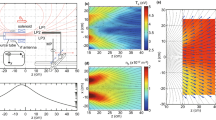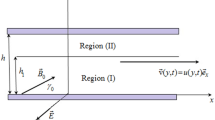Abstract
DIRECT generation of electrical power can be achieved by driving a conducting gas through a magnetic field transverse to the direction of flow. The necessary conductivity is obtained by heating the gas to a temperature at which appreciable thermal ionization occurs, the latter in accordance with the Saha equation. The conducting gas will be considered to consist of neutral particles and charged particles, no distinction being made between ions and electrons. It is the purpose of this communication to discuss the behaviour of this system as it flows along a duct (neglecting wall effects) through a uniform transverse magnetic field as shown in Fig. 1.
This is a preview of subscription content, access via your institution
Access options
Subscribe to this journal
Receive 51 print issues and online access
$199.00 per year
only $3.90 per issue
Buy this article
- Purchase on Springer Link
- Instant access to full article PDF
Prices may be subject to local taxes which are calculated during checkout
Similar content being viewed by others
Author information
Authors and Affiliations
Rights and permissions
About this article
Cite this article
MAITLAND, A. Some Consequences of Ion Slip in a Plasma flowing through a Magnetic Field. Nature 194, 670–671 (1962). https://doi.org/10.1038/194670a0
Issue Date:
DOI: https://doi.org/10.1038/194670a0
Comments
By submitting a comment you agree to abide by our Terms and Community Guidelines. If you find something abusive or that does not comply with our terms or guidelines please flag it as inappropriate.



